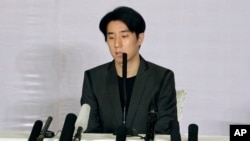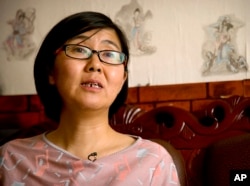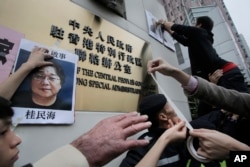A human rights group has released a lengthy report detailing, among other things, 45 high-profile forced confessions that were aired on Chinese media since Xi Jinping became China's top leader in 2013.
In a 106-page report entitled Scripted and Staged: Behind the Scenes of China's Forced TV Confessions, Safeguard Defenders argues that by airing the confessions, the media organizations have been complicit collaborators of the state's human rights violations and should face international sanctions.
The report further ties in with the current discussion in the United States about China's unfair trade practices a situation where, observers say, Chinese media can operate freely almost anywhere in the world, but where there is no similar access for foreign media in China.
Unfair trade practice
"This is just another area within [the] economy where China is allowed to act when it serves them according to the economic rules that most others play with, but they refuse to play on those rules for themselves. And it's obviously very unfair," said Peter Dahlin, one of the 45 individuals cited in the report.
He added the United States should ban all Chinese media until China grants equal access to American media.
Dahlin, a Swedish rights activist, said that during his 23-day detention in China in early 2016, he was forced to confess on CCTV that he had violated Chinese law and caused harm to the Chinese government through activities as a human rights activist.
He said the reason he agreed to such recording was to save his girlfriend, who committed no crime but was also taken into police custody. And he was neither told, nor was aware of the public use of the recording until he was led into a room where he met the CCTV crew for the first time.
According to Dahlin's testimony, while recording, he stumbled four times on the line "I have hurt the feelings of the Chinese people" and then the CCTV journalist leaned in and asked "you really don't want to say this line, do you?" — suggesting journalists were aware that such confessions were staged and words were put into the confessors' mouths.
Directly culpable
Safeguard Defenders argues that Chinese state broadcasters, including CCTV, the major vehicle for televised confessions, are directly culpable.
Calls and emails to both CCTV and China Daily for reaction to Safeguard Defenders' accusations went unanswered. Dong Qian, a veteran CCTV host, and Tammy Tam, editor-in-chief of South China Morning Post did not respond to private emails. The rights group accused both of involvement in the production of forced TV confessions. A lawyer at Beijing's DeHeng Law Offices, who represents CCTV, also refused VOA's request for an interview.
Safeguard Defenders urges the international community to pressure China into putting an end to the practice by utilizing, for example, the U.S.'s Foreign Agents Registration Act (FARA) to force responsible Chinese media to register as a foreign agent.
It also calls for sanctions, travel bans, and asset freezes on top Chinese state media executives, following the EU's precedent in 2013 to impose sanctions against top executives at Iran's Press TV after it broadcast a series of forced confessions.
According to Dahlin, the United States has applied the FARA against a few individuals with China Daily USA. Hence, the push for fuller sanctions on them to place them under closer scrutiny should be possible, he said.
Safeguard Defenders, moreover, has called on other countries to follow the United States' example and introduce Magnitsky-style legislation so as to pursue action against all Chinese state media.
Unacceptable practice
"We just urge this kind of action for one reason: to send Beijing a message this is not acceptable, this kind of human rights violations," said the report's editor, Rachael Tyrell at Safeguard Defenders.
"It's not acceptable being broadcast in our [China's] own country and also, in several cases, using citizens who are not even Chinese citizens, who are citizens of other countries, including Sweden, the U.S., UK and Taiwan," she added.
Tyrell called the practice a "systematic" problem that has victimized many dissidents in China, including domestic or foreign rights workers, lawyers, journalists and business people.
Among those profiled in the report were rights lawyer Wang Yu, Jaycee Chan, the son of actor Jackie Chan; internet celebrity Guo Meimei; Gui Minhai and students of jailed Uyghur scholar Ilham Tohti.
Wang was the first lawyer targeted by China's sweeping crackdown on rights defenders in 2015. Chan faced marijuana charges and Guo was accused of organizing illegal gambling and charging for sexual services while Gui, a Swedish bookseller in Hong Kong, was arrested for selling gossipy books about Chinese leaders and confessed to drunk driving charges.
In particular, in Gui's third confession in February he was made to accuse Sweden of using him as a "pawn" and "spoiling his happy life in China," according to the report.
Gui disappeared from a vacation home in Thailand in 2015 only to resurface in police custody in China several months later.
Extralegal tactics
Rights lawyer Teng Biao said the practice of sham trials and forced confessions hadn't been popular since China's Cultural Revolution era.
"The use [of forced confessions] has been rare after the end of the Cultural Revolution until Xi came to power. It was, in particular, put into wide use [during the crackdown on rights lawyers] in 2015," said Teng, co-founder of the China Human Rights Accountability Center (CHRAC), which participated in recommending candidates for the Magnitsky-sanction list to the U.S. government.
"It was one of those extralegal measures the Chinese Communist Party has adopted to counter [opposition and] challenges from the private sector. Televised confessions result in the gravest, horrifying and intimidating effects," he added.
All in all, sanctions on Chinese human rights violators will be effective in curbing the practice, the lawyer said, although the international community has to show a commitment to address China's poor human right record.












